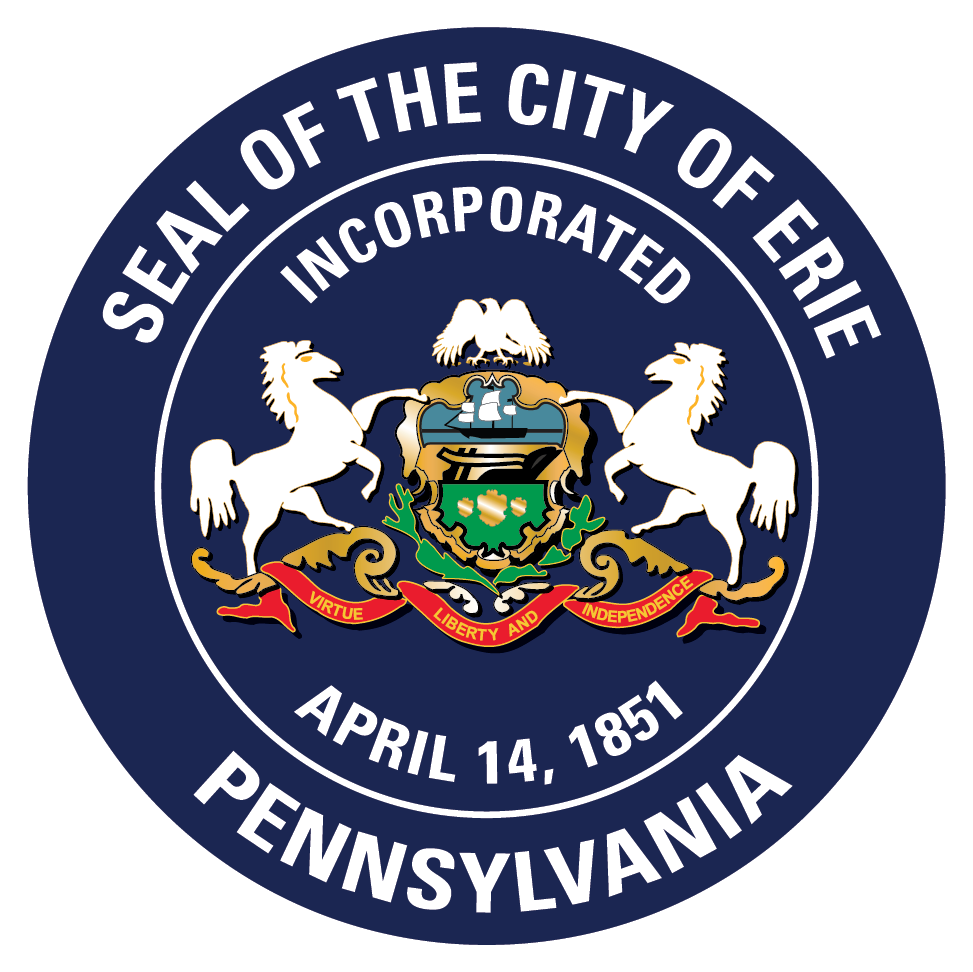Stormwater Management
Stormwater FAQs
1) What is stormwater?
Stormwater commonly refers to runoff from snow/ice melt and rain. In natural settings, the water soaks into surfaces and flows into adjacent streams and rivers. In urbanized areas, natural surfaces are often replaced with hard or impervious surfaces such as houses, streets, sidewalks, parking lots, patios, and other similar structures. When not properly controlled, stormwater can overwhelm streams, cause flooding, soil erosion, and can contribute to surface water pollution.
2) What is the stormwater fee and why is it now in place?
A: In the fall of 2022, the City of Erie enacted a new Stormwater Ordinance Fee to provide a dedicated funding source to more adequately maintain and reinvest in the City’s aging stormwater infrastructure. The ordinance established an annual fee for every developed parcel in the City, regardless of taxable status, to defray the costs of the City’s Stormwater Management Program. The stormwater fee will provide dedicated revenue and enable the City to provide enhanced maintenance, plan system replacement of existing infrastructure, and meet federal and state regulations for stormwater management.
3) There are appeals/credit processes. How do they work?
One way to reduce your bill is to earn credits through implementing certain onsite practices. This can be done by installing best management practices approved by the City. For more information on potential credits, refer to the City’s Credit Manual available below. If you believe that your bill is incorrect, you can file an appeal utilizing the same link above. Please be advised that your roof impervious area is not the same as your foundations square foot on the tax records. The deadline to file a 2024 stormwater fee appeal is 5/15/2024. Please email the appeal form to eiwanenko@erie.pa.us or drop the form off at 626 State St, Erie PA, 16501.
4) What is the City of Erie’s stormwater system comprised of?
A: The City of Erie, like other urbanized areas, uses catch basins, storm sewers, and other structures to manage the movement of stormwater. Because some sections of the system are over 100 years old, occasional repairs and replacement are required. Currently, the maintenance of the system is paid for under the City’s general fund, which is mostly funded through real estate taxes. This means that tax-exempt property owners are not contributing to the system, and funding availability is directly impacted by competition for other spending priorities. The result is that funding for system upkeep has been inadequate, unstable, and unable to keep pace with the growing need for system management, maintenance, and expansion.
5) How is a stormwater fee different from a tax?
A: Taxes are collected from parcel owners, based on the assessed value of their property. Taxes cover costs for many general government services. A fee is charged to support a specific service, such as gas, electric, water or garbage collection. The stormwater fee provides an equitable way to distribute the cost of the Stormwater Management Program, by ensuring that every parcel owner using and placing a burden on the system is paying. All users of the stormwater system will pay a fee based on their impervious roof coverage.
6) How was the fee determined for properties?
A: All property owners in the City of Erie who have 500 square feet or more of impervious roof coverage will be assessed the fee. If you are a homeowner:
- Small tier: Homeowners with 500-1,200 square feet of impervious roof coverage pay $12 per year.
- Medium tier: Homeowners with 1,201-1,550 square feet of impervious roof coverage pay $24 per year.
- Large tier: Homeowners with more than 1,550 square feet of impervious roof coverage pay $36 per year.
Stormwater fees for businesses, nonprofits, and public entities will be calculated, based on the number of billing units, with each billing unit equal to 2,136 square feet of impervious area. Each Equivalent Residential Unit (ERU) rate per 2,136 square feet is $24 per year. For example:
- 10,000 square feet of impervious area is equal to 5 ERUs and the fee is $120 per year.
- 427,000 square feet = 200 ERUs = $4,800 per year.
- 1,708,800 square feet = 800 ERUs = $19,200 per year.
7) How is impervious surface area calculated?
A: The City used aerial imagery to identify impervious surfaces. The surface area is calculated using Geographic Information Systems (GIS) computer software. Impervious coverage is different than the square footage of the home and its foundation.
8) How can property owners pay their bills?
A: Property owners can pay their bills:
- Online at cityof.erie.pa.us under the “Make A Payment” tab
- At the City’s Treasurer’s office, 626 State St.
- Checks can be mailed to: City of Erie Treasurer, c/o First National Bank of PA, P.O. Box 1534, Hermitage PA 16148-0534
9) What happens if someone doesn’t pay their stormwater fee?
A: If the fee is not paid on time, a penalty of 10% will be applied to the bill. If the late bill is not paid by the late due date, a 1.5% penalty for every 30 days will be applied. Failure to pay may result in a lien on personal property in accordance with the Municipal Claims Act 53 P.S. Section 7101.
10) How can I tell what property my stormwater bill is for?
A: Use the online property tax search function at egov.erie.pa.us/eGovPlus/tax/tax_search.aspx and type in your index number.

